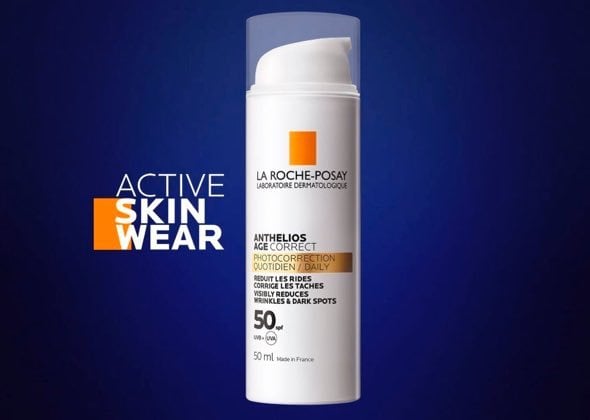WHAT IS
OILY SKIN?
Oily skin, or seborrhea, is an excess of sebum that usually shows up as shiny patches on the central areas of the face, particularly the forehead and nose. The skin’s pores are dilated and the skin is thicker. In the most severe cases, an oily coating is perceptible when touching the skin. Seborrhea can also occur on the scalp, and make your hair feel greasy and sticky.
The role of sebum is to protect the skin from drying out. Paradoxically, oily skin often becomes flaky on the surface, sometimes causing seborrheic dermatitis in the centre of the face and / or on the scalp.
WHAT CAUSES
OILY SKIN?
And can oily skin lead to acne symptoms?
Oily skin is common, mainly on the face and scalp. It occurs when the skin’s sebaceous glands work overtime and produce too much sebum. The good news is that people with this skin type tend to have fewer wrinkles in the long run. The bad news is that it can create perfect conditions for blackheads, whiteheads, and other symptoms of acne.
COMMON CAUSES
OF OILY SKIN
Hormones
Hormonal changes can stimulate increased production of sebum. Hormones fluctuate during puberty, before periods, during pregnancy, and at the time of menopause. Stress or illness can also cause hormonal imbalances, resulting in oily skin and acne.
Diet
Consuming excessive amounts of trans-fats, processed carbohydrates, sugar, and dairy foods can trigger acne. Eating a balanced diet of whole foods is good not just for your skin, but also for your overall health.
Climate
Hot, humid weather can stimulate the production of sebum, hence your skin may tend to become oilier during the summer months.
Genetics
Many people are simply born with a tendency to produce more sebum. The downside is oily skin. The upside is that your skin is thicker and less prone to wrinkles!
Over-washing
The more you scrub and strip away your skin's natural sebum, the more it will produce to try to restore balance.
Cosmetics
Oil based make-up will block your pores, add to the shine effect, and possibly cause acne. Harsh products can damage your skin, triggering increased sebum production.
Medication
Some prescription drugs cause dehydration. Your skin will then produce more oil to compensate.
HOW BEST TO CARE
FOR OILY SKIN
Cleanse your face every morning and evening, and also before and after exercise
Excess oil has a tendency to trap dirt and bacteria in your pores, so it's important to cleanse your skin and remove makeup at the end of each day. Sebum will also build up as you sleep, so gently cleanse your face in the morning. Finally, whilst exercise is good for your skin, dead skin cells, bacteria, and dirt can accumulate whilst you're in the gym, leading to 'workout breakout'. Remove your makeup before exercising, and cleanse your face and body afterwards.
Be gentle with your skin
It's so tempting to give your oily skin a good old soapy scrub. But don't do it! Did you know that the more vigorously you attempt to remove the oil, the more sebum your skin will produce to replace it? It is therefore important to use products formulated for your oily skin type, and avoid using anything harsh or abrasive. For an effective anti-acne skincare regime, look for gentle cleansers that don't contain oil or alcohol.
Dermatologists often prescribe micellar waters specifically created to reduce sebum production such as EFFACLAR Micellar Water. Foaming cleansers are not banned, as long as they are formulated to gently remove excess sebum and impurities from oily and acne-prone skin, such as EFFACLAR Cleansing Foaming Gel. After cleansing, pat your face dry with a soft, clean towel.
Moisturise (yes!) and mattify your skin
Using moisturiser will only make my skin oilier, right? Wrong. Applying an oil-free moisturiser will help to protect and hydrate your skin. Hydrated skin is not the same as oily skin. What’s the difference? Hydrated skin has a high water content, whereas oily skin is suffused with oil or lipids. The right moisturiser for oily and acne-prone skin will boost skin’s water content, which actually reduces the amount of sebum your skin produces. So do include a quality moisturiser in your daily routine, and remember the ideal moisturiser for oily skin will have a mattifying effect. An ideal option for sensitive oily and acne-prone skin is EFFACLAR Mat or a specific acne treatment cream like EFFACLAR Duo (+).
Choose appropriate cosmetics and skincare products
It's important to choose cleansers, moisturisers, and sunscreens that are specially formulated treat oily skin types. Look for the words 'oil-free', or 'non-comodegenic'. This means that the products won't clog pores and cause breakouts. Women with oily skin often have particular problems with make-up. Some make-up can be harsh on the skin, and hence cause it to produce even more sebum, and possibly trigger acne. Opt for make-up specifically created for oily and acne-prone skin.
For a sheer complexion-evening effect that simultaneously provides care for your acne-prone skin, try the 2-in-1 tinted treatment EFFACLAR Duo(+) Unifiant. For higher coverage, a suitable foundation would be TOLERIANE Teint Corrective Liquid Foundation which is very light on oilier skin types and offers an all-day-long mattifying effect. Fan of matte compact foundations? Try TOLERIANE Teint Compact Powder Mineral Foundation, which purifies and mattifies without blocking pores. To conceal localised spots and imperfections, grab a TOLERIANE TEINT Corrective Concealer pen.
Eat well
Surprisingly, oily foods do not cause oily skin. In fact, eating oily fish can have a very beneficial effect. However, there is evidence that over-indulgence in dairy and high Glycaemic Index foods (such as white flour or sugar) can cause acne breakouts. For optimal skin health, eat a well-balanced diet rich in fruit, vegetables and high-fibre foods.
Click HERE to learn more about expert skincare for acne.
For information on how acne works, click HERE.
This article is intended as general information only. You should talk to your dermatologist of GP for further information about acne treatments.








